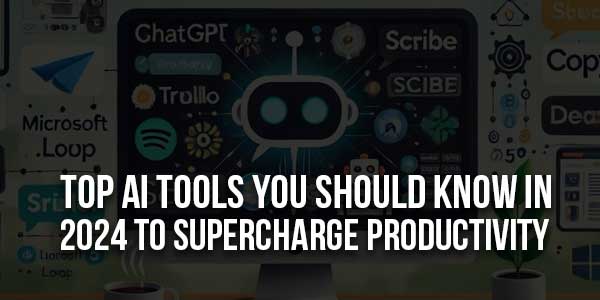
Artificial Intelligence (AI) has reshaped how we work, making it possible to complete tasks faster, smarter, and less effortless. As technology advances, new AI tools are emerging to help businesses, freelancers, and entrepreneurs manage workflows, analyze data, and enhance productivity.
In this guide, we’ll explore top AI tools for productivity in 2024 across categories like automation, data analysis, content creation, and more. Whether you’re a business owner, a creative professional, or someone looking to boost efficiency, these AI-powered tools are game-changers.
Table of Contents
Why AI Tools Matter In 2024?
AI tools have become critical assets, with their popularity skyrocketing due to multiple benefits:
- Enhanced Efficiency: Automate routine tasks and reduce manual errors.
- Better Decision-Making: AI tools analyze data swiftly, offering insights that improve decision accuracy.
- Cost Savings: With automation, businesses can save on labour costs and direct resources toward more impactful initiatives.
- Competitive Advantage: Leveraging AI ensures staying ahead of competitors, thanks to optimized workflows and innovative solutions.
“AI isn’t just a technology; it’s a business ally. With the right tools, it transforms challenges into opportunities.”
Best AI Tools By Category:
To help you find the best fit for your needs, we’ve organized AI tools into key categories based on their primary functions. Let’s dive into the top picks in each area.
1.) Automation & Workflow Management:
Automation tools have become essential for anyone looking to streamline processes and improve accuracy in repetitive tasks. Here are some of the best AI tools in this category:
1.1) Zapier:
Zapier connects apps and automates workflows, allowing businesses to create “zaps” that automate tasks between apps.
- Key Features:
- Integration with thousands of applications
- Customizable workflows
- Conditional logic for advanced automation
1.2) UiPath:
UiPath is a leading Robotic Process Automation (RPA) tool that enables businesses to automate intricate, high-volume processes.
- Key Features:
- Task recording and automation design
- AI-based decision-making
- Real-time process insights
1.3) Asana:
Asana is a project management platform that uses AI to streamline task assignments, deadline management, and communication.
- Key Features:
- Automation rules and templates
- Task prioritization suggestions
- Integration with popular apps and communication tools
2.) Data Analysis & Insights:
Data-driven decision-making is more important than ever, and these AI tools provide actionable insights from large datasets.
2.1) Tableau:
Tableau is a powerful data visualization tool that leverages AI to interpret and visualize data trends.
- Key Features:
- Interactive dashboards
- Predictive analytics
- Seamless integration with multiple data sources
2.2) IBM Watson Analytics:
IBM’s Watson Analytics offers sophisticated data analysis and natural language processing, helping users uncover trends and patterns.
- Key Features:
- Smart data discovery
- Automated predictive analytics
- Detailed visualizations
2.3) Microsoft Power BI:
Power BI is Microsoft’s data visualization tool, designed to simplify data insights for enterprises.
- Key Features:
- Easy data sharing within organizations
- AI-driven insights and visualization
- Integration with Microsoft Office suite

3.) Content Creation & Marketing:
AI has unlocked a new level of creativity and efficiency in content creation and marketing. From generating text to analyzing trends, these tools are invaluable.
3.1) ChatGPT by OpenAI:
ChatGPT has revolutionized AI-powered text generation, enabling businesses to draft content, respond to customer inquiries, and brainstorm ideas.
- Key Features:
- Natural language text generation
- Chat-based interactions for customer service
- Language translation and summarization
3.2) Canva Pro:
Canva Pro uses AI to assist in designing graphics for social media, presentations, and marketing materials.
- Key Features:
- Pre-designed templates and layouts
- AI-based image enhancement tools
- Brand management and collaborative features
3.3) Copy.ai:
Copy.ai assists marketers in writing content for blogs, social media, and ad campaigns, using AI to suggest engaging copy.
- Key Features:
- AI-driven copy suggestions
- Customizable content tones
- Team collaboration features for agencies
“Content creation tools powered by AI save hours of brainstorming, offering instant creative inspiration.”
4.) Customer Support & Communication:
The need for responsive, accurate customer service has never been higher. AI-powered customer support tools provide reliable assistance without lag.
4.1) Zendesk AI:
Zendesk’s AI capabilities improve customer interactions by providing faster and more accurate support.
- Key Features:
- AI-driven customer insights
- Chatbots for instant response
- Advanced analytics for support teams
4.2) Intercom:
Intercom combines live chat, customer management, and AI-powered bots to engage users and resolve queries promptly.
- Key Features:
- Smart chatbots for FAQs
- Customer segmentation
- Automated support workflows
4.3) HubSpot AI Chatbot:
HubSpot’s chatbot is integrated into its CRM, helping businesses automate customer support and improve lead engagement.
- Key Features:
- Personalization for targeted responses
- Data-driven customer insights
- Seamless integration with HubSpot CRM
Conclusion:
As we move through 2024, AI tools are continuing to evolve, becoming even more accessible and efficient for individuals and businesses. Each tool mentioned here offers distinct benefits, from automating workflows and generating data insights to enhancing content creation and customer support. By embracing these technologies, you can supercharge productivity and keep pace with the demands of today’s fast-moving digital landscape.
“In the age of AI, it’s not about working harder but smarter. Equip yourself with the right tools and watch productivity soar.”


















Be the first to write a comment.